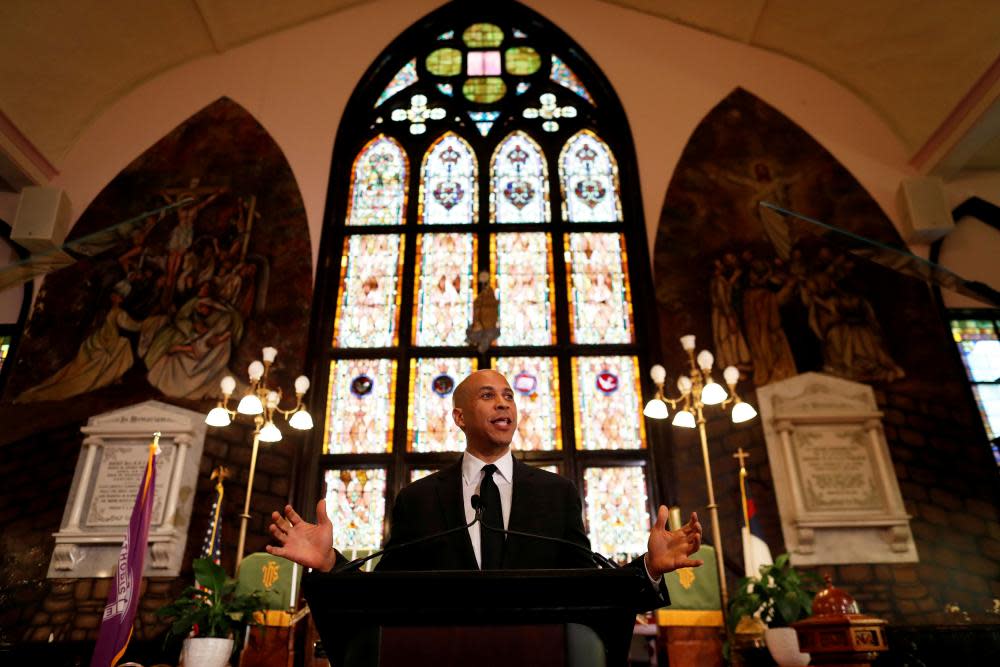Cory Booker wants $90m a year to prevent urban gun violence

For more than a decade, faith leaders from black and brown communities have come to Congress with the same request: spend more money on local strategies to prevent gun violence.
Now, the New Jersey senator Cory Booker is introducing legislation that would devote $90m a year to programs that prevent urban gun violence.
Booker’s new grant program would focus federal dollars on helping the cities with the highest gun homicide rates, and it would prioritize funding for strategies that do not contribute to mass incarceration.
Instead of simply directing more federal money to local law enforcement, the new legislation would require cities to give at least half of their federal grant dollars to community organizations that provide services to high-risk people, or to a public department “that is not a law enforcement agency”.
Booker’s bill does not include any gun control provisions: it’s focused on strategies that prevent shootings by focusing on the people, not the guns.
“We’re in a tough political climate,” said Pastor Michael McBride, a California-based activist who has spent the last decade campaigning for more resources for local gun violence prevention. “This approach charts a way forward that does not bog us down in these intense debates over the second amendment or gun control.”
Booker’s legislation is designed to fund programs that have shown success in reducing gun violence in cities such as Oakland and Richmond, California; Boston, Massachusetts; and New York City. The legislation would devote $90m a year over 10 years to evidence-based approaches to gun violence reduction.
In the past decade, as they have invested public dollars into expanding community-based strategies, Oakland has seen a 44% decrease in its gun homicide rate, and nearby Richmond has seen a 67% decrease in its gun homicide rate.
Related: Can Chicago's new mayor stop the bloodshed from gun violence?
The decreases in Oakland, Richmond, and San Francisco have driven a 30% decrease in the overall gun homicide rate across the greater San Francisco Bay Area, even as the number of people living in poverty in the region has increased, and as property crime has spiked in some areas. The decrease in the area is much larger than in the nation overall.
The successful local strategies highlighted in Booker’s legislation include investing in street outreach workers or “violence interrupters”, trusted community members who intervene in local gang conflicts to keep violence from spreading; funding intervention programs in hospitals to help shooting victims change their lives; and supporting “group violence intervention” strategies, such as Boston’s Operation Ceasefire, that bring together law enforcement, community partners, and faith leaders to intervene with the small number of men in each city who are most likely to shoot or be shot.
Booker’s Break the Cycle of Violence Act is co-sponsored by the US representative Steven Horsford, a Nevada Democrat whose father was shot to death during a robbery when he was 19.
“These deaths are preventable,” Horsford said in a statement.
Related: Guns and lies in America: sign up for email updates
Mass shootings are usually the focus of America’s gun control debate. But the majority of America’s gun homicide victims are killed in smaller daily shootings in neighborhoods that have struggled with gun violence for decades.
Black men and boys, who make up just 6% of America’s overall population, represent more than 50% of the country’s gun homicide victims.
A 2015 Guardian investigation found that half of the country’s gun homicides were concentrated in just 127 cities and towns. Experts have argued for years that American gun violence is highly concentrated, and that one of the best ways to save lives is to devote more resources into the neighborhoods with the greatest need.
Black and brown activists have often felt “invisible” and “erased” from the American gun control debate, McBride said.
“Our communities are used as props, but never really given serious consideration on how to scale up strategies that save our lives and heal our communities,” he said.
The new legislation focuses resources on the majority of America’s gun violence victims – and it also focuses on solutions that are less politically controversial than gun control laws, McBride said.
“We think Republicans, historically, have been huge supporters of these kinds of strategies, because of the role that faith communities and redemption and healing play,” he said.

